Clio Celebrates 150 Years of Sisterhood
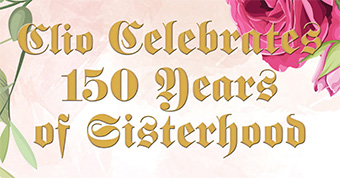 by Stephanie (Coartney) Dulaney '10
by Stephanie (Coartney) Dulaney '10
Sometimes the hardest-won battles are those made to withstand the test of time. This
year marks the 150th anniversary of the founding of Clio, McKendree’s first female student organization and longest-running club. In that
same year, the college finally opened its doors to women after decades of rejection.
Like most higher learning institutions at the time, McKendree was starting to learn
the true value and power of an educated woman. For the women of Clio, much has changed
in a century and a half, but the same resolve to let their voices be heard is as strong
today as it was at the group’s founding.
By 1869, McKendree administrators had been hotly debating the topic of admitting female
students for many years. While the college started as co-educational early on, it
began segregating its female students into a separate academic department and building
in the 1830s. It was not long before they were denied an education altogether. When
the time came to readmit women, many members of the campus community were still not
keen on it. In fact, several male students reacted by stealing one of their professor’s
best mares and leaving it in a second-floor classroom with a sign around its neck
that read “First female student in McKendree.” The newly admitted women soon learned
they would have to prove themselves if they wanted to be taken seriously.
While they were given equal educational opportunity, the female students were not
allowed to join Plato or Philo, the two men’s literary societies. Administrators felt
the men’s sometimes-raucous behavior, which included the occasional theft of an unsuspecting
hen for dinner, would have a corrupting influence. Therefore, within just a few weeks
of starting classes, the women decided to form their own society, which they called
“Clio,” after the Greek muse of history. Little did they know the organization they
formed under the values of loyalty and sisterhood would outlast both men’s societies,
two world wars, an economic depression and vast cultural changes.
As precursors to modern day fraternities and sororities, literary societies were much
more than book clubs, as their name might suggest. Students at some of the country’s
earliest colleges formed them to practice and hone important skills not taught in
the classroom, mainly speaking (impromptu and prepared orations), essay writing and
debate. Literary societies often held public speaking competitions and encouraged
proper etiquette and acts of service, all of which helped college students of the
time become more well-rounded individuals.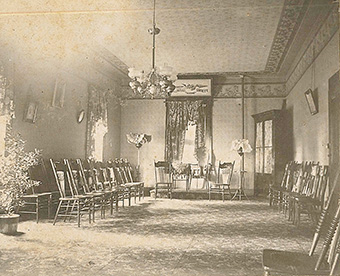 Clio’s first event as group, a public performance on May 6, 1870, featured the talents
of its members through songs, speeches and original readings. The whole of McKendree
was so impressed that the men of Philo and Plato soon accepted Clio as a legitimate
student organization, and the Board of Trustees gave the group its own hall for meetings.
Although Clio Hall was small (half of the present-day Circuit Riders room in Bothwell
Chapel), it was a space all its own. Sparsely furnished with a few tables, chairs
and a wood stove for heat, the room had only coal oil lamps; meetings were held by
lamplight during the short winter days. Once electricity came to campus, Clio petitioned
the faculty to allow evening meetings to make more use of the exciting new amenity.
The faculty refused, however, deeming it unsafe for the girls to walk unaccompanied
across campus in the dark.
Clio’s first event as group, a public performance on May 6, 1870, featured the talents
of its members through songs, speeches and original readings. The whole of McKendree
was so impressed that the men of Philo and Plato soon accepted Clio as a legitimate
student organization, and the Board of Trustees gave the group its own hall for meetings.
Although Clio Hall was small (half of the present-day Circuit Riders room in Bothwell
Chapel), it was a space all its own. Sparsely furnished with a few tables, chairs
and a wood stove for heat, the room had only coal oil lamps; meetings were held by
lamplight during the short winter days. Once electricity came to campus, Clio petitioned
the faculty to allow evening meetings to make more use of the exciting new amenity.
The faculty refused, however, deeming it unsafe for the girls to walk unaccompanied
across campus in the dark.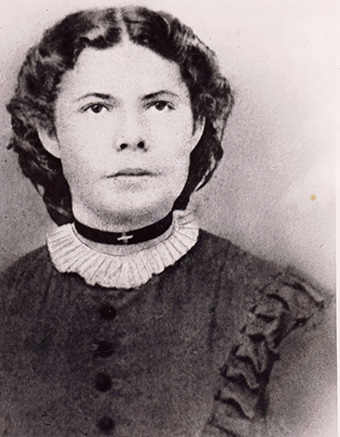 The inaugural Clio group included the first female graduate of McKendree, Edith (Flint) Thrall ’1870. Named a senior upon her admittance to McKendree in 1869, Edith was Clio’s first
president and she wrote its founding constitution. Both of her brothers attended McKendree,
so one can only imagine her thrill at becoming the college’s first woman graduate.
A Lebanon native, Edith brought her pioneering spirit to Clio and even delivered a
reading of her original poem “True Living” at the 1870 commencement ceremony. She
taught in several country schools and Lebanon Public School before marrying fellow
McKendree graduate and Methodist minister Leonidas Worthy Thrall in 1873. Their four children attended McKendree, and when Edith passed away in 1898,
her funeral was held in Bothwell Chapel, demonstrating the special significance the
college had for her.
The inaugural Clio group included the first female graduate of McKendree, Edith (Flint) Thrall ’1870. Named a senior upon her admittance to McKendree in 1869, Edith was Clio’s first
president and she wrote its founding constitution. Both of her brothers attended McKendree,
so one can only imagine her thrill at becoming the college’s first woman graduate.
A Lebanon native, Edith brought her pioneering spirit to Clio and even delivered a
reading of her original poem “True Living” at the 1870 commencement ceremony. She
taught in several country schools and Lebanon Public School before marrying fellow
McKendree graduate and Methodist minister Leonidas Worthy Thrall in 1873. Their four children attended McKendree, and when Edith passed away in 1898,
her funeral was held in Bothwell Chapel, demonstrating the special significance the
college had for her.
Edith’s gifts as a writer, leader and advocate for others laid the foundation for
the values that would hold Clio together throughout the years. In her poem “True Living,”
she reminded her fellow students of what it means to live a purposeful life, one whose
legacy touches others long after death whether or not they earned fame and success.
“For changes oft will come, and mighty too,” she writes. “Though diverse as the faces
that we wear, / May be the paths our restless feet explore, / Still the deep undercurrent
of each life / Sets strongly toward the self-same shore.” Her words echo through generations
of McKendreans and especially Clio women, reminding them that whether you are in the
Class of 1870 or 2020, we share more in common than we think.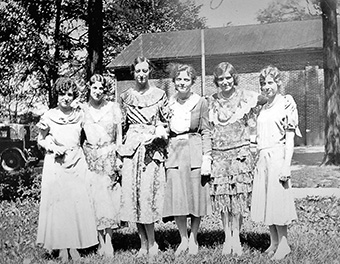 In the years that followed, mighty changes did come to Clio as each new class of women
added to its strong foundation of friendship. Mary (Reinhardt) Philip ’66 remembers how deeply her mother, Clio alumna Adelyn (Martin) Reinhardt ’32, influenced her decision to attend McKendree and join Clio. “My mother was the sole
reason I went to McKendree, with the support of my father, who sold beef cattle when
my tuition was due,” she said. “Mom always imparted her love for McKendree, Clio and
the friends she made there. The college was very small in the ’30s and seemed like
one big family. Mom received an excellent education and talked of great times with
her friends, especially Clionians. She valued her Clio pin, which I have to this day.”
In the years that followed, mighty changes did come to Clio as each new class of women
added to its strong foundation of friendship. Mary (Reinhardt) Philip ’66 remembers how deeply her mother, Clio alumna Adelyn (Martin) Reinhardt ’32, influenced her decision to attend McKendree and join Clio. “My mother was the sole
reason I went to McKendree, with the support of my father, who sold beef cattle when
my tuition was due,” she said. “Mom always imparted her love for McKendree, Clio and
the friends she made there. The college was very small in the ’30s and seemed like
one big family. Mom received an excellent education and talked of great times with
her friends, especially Clionians. She valued her Clio pin, which I have to this day.”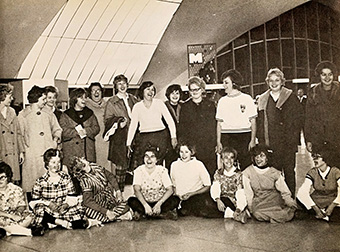 Clio was still a literary society when Mary joined in 1962. Members often gave speeches
at the start of their meetings and focused on developing speaking, writing, leadership
and etiquette skills, as well as familiarity with classic literature. At the time,
they wore white wool blazers to set them apart on campus. While they pursued intellectual
aims together, the Clio girls also had time for jokes and fun. “A crazy, fun memory
is the time we took the Clio Pledges [new inductees] to Lambert International Airport
in St. Louis,” Mary recalled. “The Pledges had to dress like charwomen and get down
on their hands and knees and scrub the floor of the main terminal with toothbrushes.
What fun for us Clionians as we watched the Pledges! Don’t think we’d get by with
that today.”
Clio was still a literary society when Mary joined in 1962. Members often gave speeches
at the start of their meetings and focused on developing speaking, writing, leadership
and etiquette skills, as well as familiarity with classic literature. At the time,
they wore white wool blazers to set them apart on campus. While they pursued intellectual
aims together, the Clio girls also had time for jokes and fun. “A crazy, fun memory
is the time we took the Clio Pledges [new inductees] to Lambert International Airport
in St. Louis,” Mary recalled. “The Pledges had to dress like charwomen and get down
on their hands and knees and scrub the floor of the main terminal with toothbrushes.
What fun for us Clionians as we watched the Pledges! Don’t think we’d get by with
that today.”
Mary went on to teach students in the Belleville School District for 30 years. She
is proud of her lifelong Clio friendships and experiences, and credits Clio for instilling
in her the passion and confidence to join similar groups later on, including the American
Association of University Women, P.E.O Sisterhood, and Union United Methodist Women.
As traditional literary societies in colleges and universities declined, replaced
by more social sororities, the nature of Clio began to evolve. Research by former
McKendree history student Kevin Decker ’89 provides insight into issues that occupied the minds of Clionians in the 1940s-60s
through records of the discussions and debates they held. In their private meetings,
topics included the state of “‘Literary Societies in America,’ whether or not McKendree
should retain its ‘no smoking/no dancing’ tradition, if jazz was great music or not,
and whether women ought to dress to please men (which was voted down strongly).”
Clio’s public debates also reflected the changing times. Issues such as communism,
the effects of television on studies, and the liberation of women were on the table
for discussion. The group began sponsoring dances, such as the Sadie Hawkins Dance,
and inviting male students to their banquets, which was looked down upon previously
under strict Methodist philosophy.
In the 1970s and ’80s, Clio membership dropped as more social fraternities and sororities
increased competition at McKendree. However, the group resurged in the late ’80s and
continued to blossom in the ’90s as its focus shifted to more relationship-building
activities.
Lisa (Vaught) Nelson ’96 joined around this time, immediately drawn to Clio’s sisterhood and core values.
Upon joining, “all Pledges chose a Pledge Mom, and her job was to mentor and be your
confidante,” she recalled. “It was the ‘Mom’s’ job to be your biggest supporter and
cheerleader. During pledging, we had to collect so many points a week by visiting
each Active [current member] and getting to know them and our fellow Pledges. We had
to memorize and recite information about each other, such as birthday, hometown, major,
etc. You really got to know a ton of information about each other!”
The family atmosphere taught Lisa how to “laugh, cry and at times disagree” with others.
“The communication skills and confidence I developed being in a sorority taught me
how to work with all types of personalities,” she said. As a regional client executive
with the U.S. General Services Administration, she now uses those skills daily in
her interactions with the nation’s courts, marshal service, attorneys and trustees.
“I feel the close bond of sisterhood has not changed,” said Lisa. “But I know the
fashion and hairstyles have changed for the better!”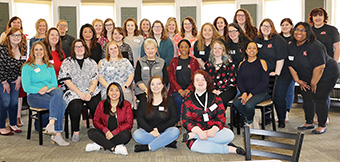 Today’s Clio has adopted its Greek letters, Kappa Lambda Iota, and made it a priority
each year to raise resources for a cure for breast cancer and to host a spring formal
and other social events. Its longevity is one reason why new Clionians are attracted
to join each year. “I liked the history of the group,” said Julia (Surdyke) Hunt ’16, who serves as its staff sponsor. “They weren’t allowed to join the men’s societies,
so they made their own. They were rebels, and I thought that was really cool.”
Today’s Clio has adopted its Greek letters, Kappa Lambda Iota, and made it a priority
each year to raise resources for a cure for breast cancer and to host a spring formal
and other social events. Its longevity is one reason why new Clionians are attracted
to join each year. “I liked the history of the group,” said Julia (Surdyke) Hunt ’16, who serves as its staff sponsor. “They weren’t allowed to join the men’s societies,
so they made their own. They were rebels, and I thought that was really cool.”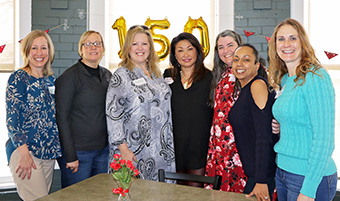 Junior Claire Jennings, alumni chair for the group, notes that tradition is a key component of the present
day club. “I think in some ways Clio has evolved with modern times, but the meaning
of our group is the same,” she said. “The McKendree archives have pictures of Clionians
posing together dating back to the early 1900s; we replicate the same pictures today.
Our induction and initiation ceremonies are very special to us, and we perform them
the way our sisters before us did.”
Junior Claire Jennings, alumni chair for the group, notes that tradition is a key component of the present
day club. “I think in some ways Clio has evolved with modern times, but the meaning
of our group is the same,” she said. “The McKendree archives have pictures of Clionians
posing together dating back to the early 1900s; we replicate the same pictures today.
Our induction and initiation ceremonies are very special to us, and we perform them
the way our sisters before us did.”
Clio formed at a time in history when women did not yet have the power to vote. It
has witnessed countless generations of young women grow in friendship, mature in knowledge
and gain the confidence to change the world.
In the words of Edith Thrall, “True living is not measured by the years, / Nor comprehended
in the word success.” Instead, time stands as a testament to that which endures and
proves its worth: sisterhood, loyalty and friendship, the Clio way of life.

